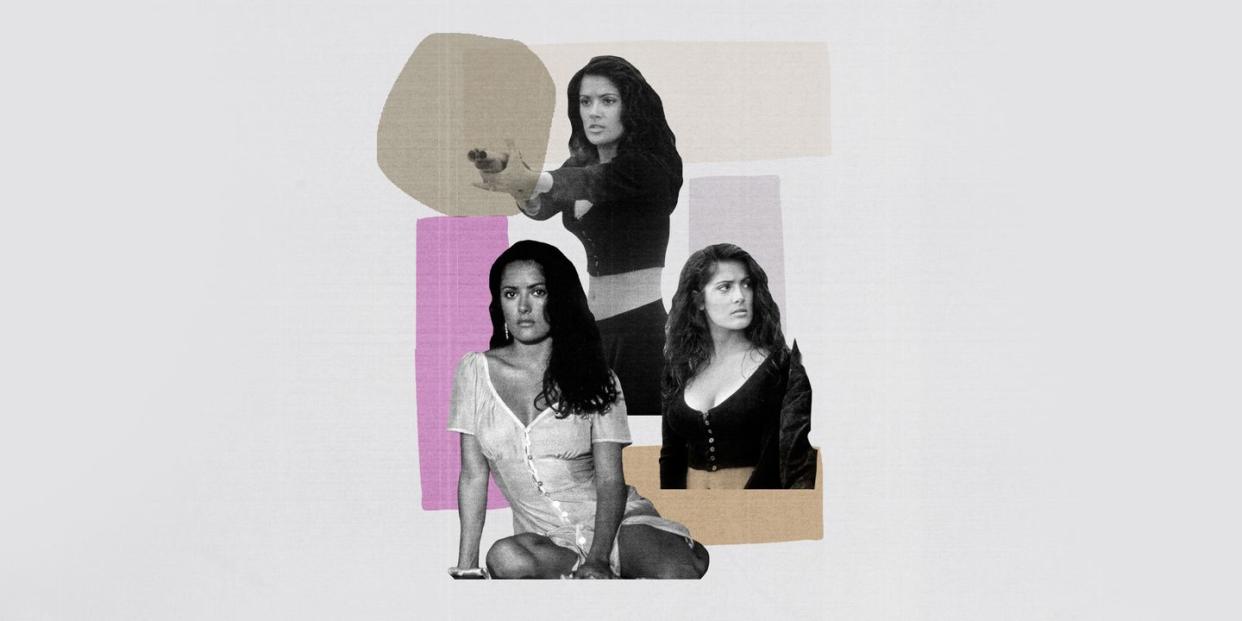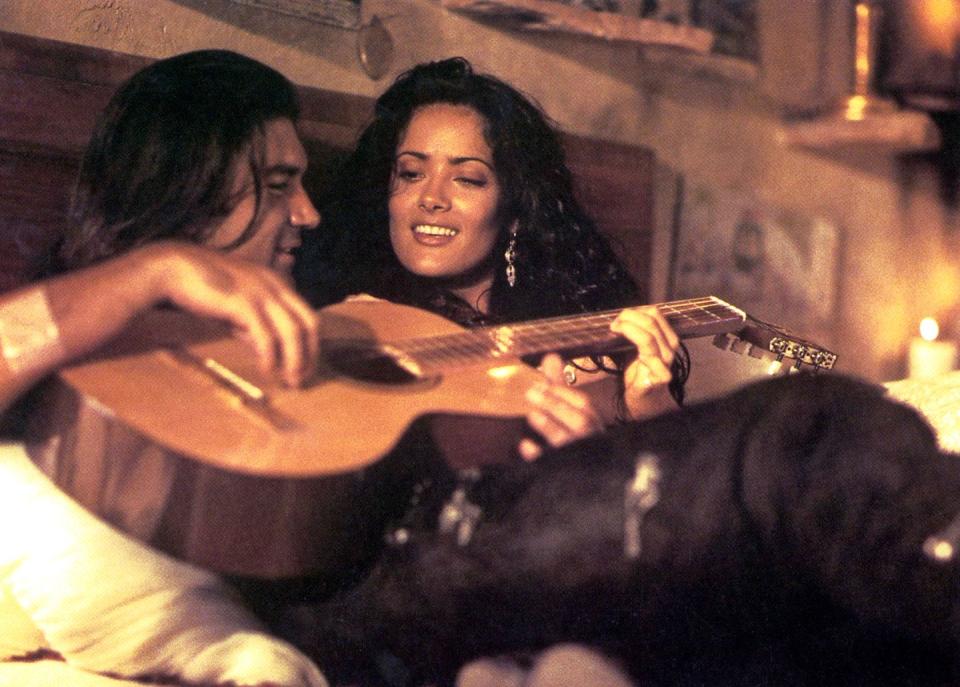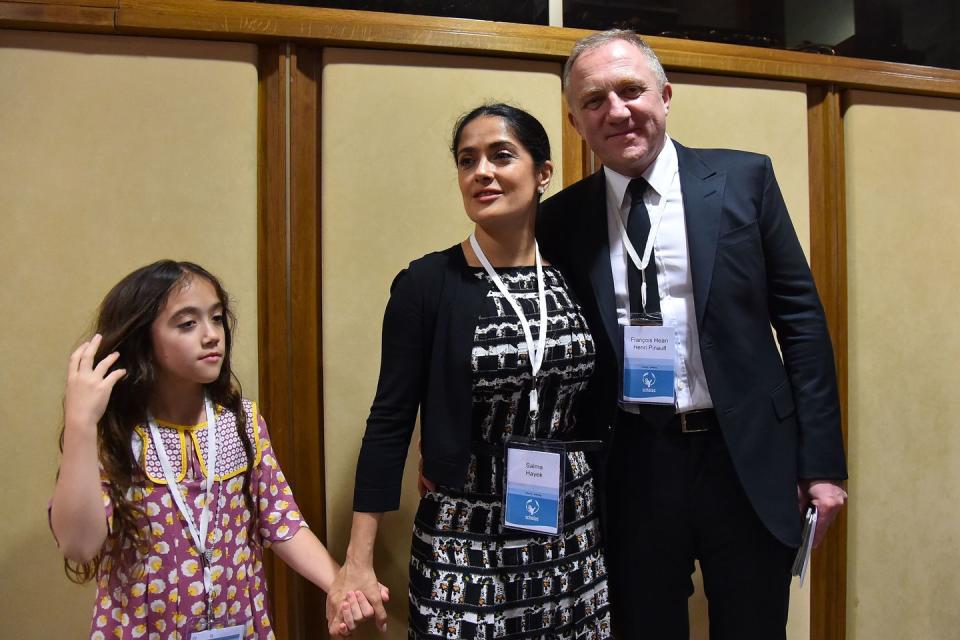‘The Studio Wanted Cameron Diaz’: Salma Hayek on the Role That Changed Her Life

- Oops!Something went wrong.Please try again later.
- Oops!Something went wrong.Please try again later.
Nearly 30 years ago, Salma Hayek made the decision to bet on herself. She was at the height of her career in her native Mexico, starring in the wildly successful soap opera Teresa, when she left it all behind to try to make it in Hollywood. It was a move that puzzled fans like comedian Paul Rodriguez, who invited her on his Univision talk show in 1992 to ask why she would take such a risk in an industry notorious for refusing to cast Latina actresses. "I'm going to change it,” she recalls telling him. “It's not normal."
Hayek reflects on this moment as she fondly remembers how she came to star in her first American film, Desperado, the cult classic that celebrated its 25th anniversary in August. Writer-director Robert Rodriguez and his then-wife, producer Elizabeth Avellán, caught a 3 a.m. rerun of Hayek’s interview and decided to offer her the role of Carolina, a Mexican bookstore owner dangerously entangled with a drug kingpin who’s also after her gunslinger lover (Antonio Banderas).
The funny thing was, Hayek and her friends had just watched El Mariachi, Rodriguez’s 1992 Spanish-language film that inspired Desperado, and it made Hayek hope to work with the filmmaker. “Oh my god, this is my opportunity,” Hayek, 54, remembers thinking after their viewing. “The director is Mexican-American [and] doing so well.” So, when she received Avellán’s early morning phone call the next day, she didn’t believe it. “I thought it was my friends making a joke,” Hayek says.

As serendipitous as that phone call felt, especially at a moment when Hayek worried her dreams for American stardom were floundering, she still had to fight for the role. The studio asked Hayek, along with the many other Latina actresses vying for this rare opportunity, to audition multiple times and perform several screen tests. She also faced the very racism she was determined to defeat. “I remember Cameron Diaz was huge at the time and her last name was Diaz, so they said she can be Mexican,” Hayek says. “She was part of the list, and I had to audition again.”
The role ultimately went to Hayek, of course, and it transformed her career. She went on to star in other hits like Rodriguez's From Dusk till Dawn, earned an Oscar nomination for Julie Taymor's Frida, and conquered television as an Emmy-nominated producer for shows including Ugly Betty. But she looks back on Desperado as the one that started it all.
Calling from her home, where she’s been spending quarantine with her husband, François-Henri Pinault, and their 13-year-old daughter Valentina, Hayek talks to ELLE.com about what she’s learned since Desperado, solidarity in Latinx representation, and what she’s doing to ensure a better future for the next generation.
Carolina’s first scene, where she stops traffic in a white blouse and skirt, is a much-used GIF on social media today. Do you remember the direction you received from Robert Rodriguez for that scene, where she locks eyes with El Mariachi [Banderas] for the first time?
No, I remember I was terrified. There are two cars coming my way, they're going to crash right behind me, and I have to not look afraid. It was not a huge budget movie and Robert has his way of working: nice and organic. So there I am walking and hoping they don't run me over and kill me. This is what I was worried about. I guess the direction, now that you mention it, was that I have to not look scared and I have to be amused by it. That was a big acting job because I was shitting myself.
Do you remember how Carolina was described in the script?
No. I mean, usually, [it’s] the age. They’re beautiful and sexy, probably. Mexican. It sounded like me.
[Laughs] It is perfect casting. Today, there are often intimacy coordinators to help provide safe spaces for actors. How did you feel about doing a major sex scene in this movie at such a pivotal point in your career?
It was a very difficult thing for me. It was not in the original script, I have to say. I think it was one of the notes that came after they showed the screen test, which made it harder for me. I was already like, “No, that was not in there the first time.”
But you went through with it.
They were amazing. What I can tell you is that I was very lucky because they set up the lights and the sound. [It was] Robert, Antonio, Elizabeth and I. Robert was operating the camera. I think there was no sound. Elizabeth was moving cable. [There] was not even a [monitor]. And I flipped out. I wouldn’t do it. They were very patient. It was two hours, and I was still not [working] up the courage. Then it was very, very nice. They closed the set. They did everything that could possibly be done. But it was one long scene with dialogue and… it was different. There were little moments before I would flip out again.
I walked out of the premiere when they played it and I took my brother, father, and mother with me. I didn't want any of them to see it. They were happy to walk out right away and then we came back again. I don't think they noticed anything.

Do you think the landscape has evolved for female characters, especially those of color who have been hyper-sexualized, now that there are greater efforts to give women more agency?
That’s evolved considerably—and very fast. In the last couple years, it’s been really drastic. I'm not saying there's no more work to do. We're still underpaid, because it's hard to adjust when they’re used to paying you something. Your wealth, of course, is not as big as the guys. And now [the industry] is struggling because they didn’t support the filmmakers, the writers, the people behind [the camera]. They never got those jobs. For television, we need female showrunners. They have no experience. Nobody else gives them a chance. We need them and everyone is looking under rocks.
Well, they’re hiding in plain sight.
Exactly. But you need the experience. One thing is to write, and another thing is to be the head over a group of writers writing a television show and being involved with the producing. There are certain things that are not just about talent but about experience. But there’s a lot more opportunities [today].
What do you think Desperado’s legacy is today?
I’m not the most objective person to ask this question. A lot of people come to me and talk about it. But from my perspective, it kind of became a cult classic. What they tell me is many people saw it many times, and they're watching again throughout the years. I've had young dudes come up to me like, “That was my father's favorite movie, and then it became my favorite movie.” It’s funny how many people bring it up still to this day. It’s not a movie that got forgotten. [That] and the scene from From Dusk till Dawn.
But you know which one didn’t get a huge platform when it came out, but people continue to discover it today? Frida. They all say, “I just saw Frida!” But it’s funny—Desperado and Frida were watched more [over] time than when they came out for sure.
I love Frida. But I'm also a huge Frida Kahlo fan.
That’s unusual. Most people didn’t know who she was. The movie made a lot of people interested. Then those people who got interested told other people, and then she became bigger and the paintings [became more popular]. And because she grew, people wanted to see the movie. It’s like, [she’s] an icon.
She absolutely is. You've had a lot of success, including an Oscar nomination for Frida and Emmy nominations for Ugly Betty. But the Academy has yet to honor a Latinx performer for Best Actress and the Emmys barely acknowledged Latinx actors this year. Do you think the new diversity mandate can guarantee more inclusion?
I hope you don't take what I'm about to say the wrong way. It was not just the Academy. When I was nominated for Frida, it was the first time a Latin [actress] was nominated for the lead. No one mentioned it in the press. The year before, Halle Berry and Denzel Washington won, and it was talked about everywhere—and rightly so. I was the first one in that category. Not one article. Nobody wrote a word about [it]. We’ve come a long way.
Yeah, though racial diversity of coverage in media continues to be an uphill battle.
We have to see both. Maybe for me, because I had it so hard. Maybe because they didn't know the difference. I’m telling you, the studio wanted Cameron Diaz as a Mexican.
That's outrageous.
Still, it was better a few years before that, when they were doing The House of the Spirits [the 1993 film adaptation of Isabel Allende’s novel that had a largely white cast]. I begged for an audition. They wouldn't even give me an audition. I was like, “Just hear me read.” And this is for a Latino role. They were not hiring Latinos for Latino roles. They were not hiring Latinos period—unless it was the maid or the prostitute. And that part was not a maid or a prostitute.
You turned 54 in September. What do you know today that you wish you knew 25 years ago?
So many things. Because things turned out well for me in, frankly, every aspect of my life, I would have taken away so much anguish. I was so afraid, but I still didn’t give up. I was afraid not to find love, a soulmate. I was afraid not to have kids. I was afraid not to be able to eat. I was afraid not to work. When you love what you do, it’s so hard. You have a passion for something and when you dedicate a lot of time to that it’s like, “Okay, this is not working out for me. But what am I going to do now? Who’s going to hire me?” I had a lot of anxiety and things were hard. I was always very grateful for the jobs, never knowing if it was the last one. I wish I could have talked to myself and said, “Don't worry, it's going to happen.”
I've always been a firm believer in change, even my own. I've also done a lot of activism for 25 years or more. You see a lot of things and for so many years, it was so sad to think that nothing changes. Then here comes this era where I got to experience and be part of the change. It’s good to have this incentive at any time, but it’s really extra good [in your 50s] because it makes you excited about the future, no matter how scary it seems. [Laughs] I'm lucky that in my lifetime, I get to see change for good. Not every generation that gets that.

That's true, though there is still so much work that needs to be done concerning the dearth of Latinx talent that are properly honored—
I'm sorry to interrupt. But I think that it needs to stop being a conversation. Because right now, it's a very loud conversation. There are some changes, and I'm grateful for it. But what I think needs to be a stronger conversation is the kids that were separated by their parents. What's happened to them? There are a lot of reports, but not enough looking into the coronavirus epidemic in these camps. There's a lot of accusations that women are being operated on without their permission.
It's terrifying.
I think the Latinx community in the entertainment industry is doing better than other Latinx communities. I want more, but I don't want to over-complain because there are others who have it much harder. I don't want to become ungrateful.
What do you hope to pass on to your daughter's generation?
So many things. Definitely equal pay is a big one. It's not necessarily just about the money. It's what's fair. And another thing is there is an improvement, a little bit, for women. We don’t want other people to [have it] harder than us. I also hope we will stop being so hard on ourselves. There’s a lot of expectations for women and I can see it with the younger girls—the way they're supposed to look, the way everybody has to be talented and successful and gorgeous. You have to be successful at work and as a mother, to be tall but not stop being a woman! We really [need to] embrace and empower ourselves. I want others to respect us. And I want girls, including me, to empower ourselves without losing our humbleness.
You Might Also Like

